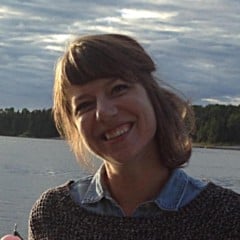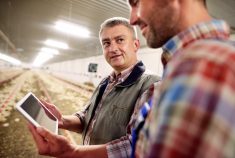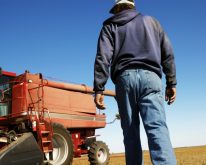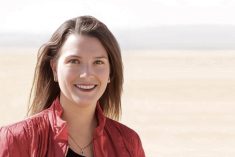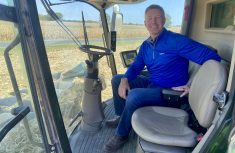It was 2017, and Kristen Ritson-Bennett was understandably overwhelmed. Ritson-Bennett is an Alberta cattle nutritionist and co-owner of a successful ruminant vitamin and mineral supplement manufacturing business. Plus she was supporting her husband Andrew in starting a second business, a veterinary clinic. And, she was pregnant with her second child.
That’s when Ritson-Bennett decided to sign up for Success for Women in Agri-Food, a training and mentorship program for Alberta women in agribusiness.
“I had no idea how I’d continue running a business, have clients, be a good mom and help Andrew start a second business. But I wanted to be able to do it all,” she recalls.
Read Also

‘No agenda, no attenda’: How to professionalize your family farm meetings
Establishing meeting ground rules can help a farm family find ways to communicate that work for the business and the family.
Signing up for a training course in the midst of all these life events might seem like the last thing you’d tell anyone to do, adding another responsibility to what was already a snowstorm of a to-do list. But for Ritson-Bennett, the program pulled all the pieces together.
“I felt like I found my people,” she says. “Being around other women who are incredibly accomplished, and being able to talk these challenges through, was so important for me.”
Ritson-Bennett came out of the program with confidence in the business skills she already had: marketing knowledge, team leadership abilities, and an understanding of how and where to find resources.

“The process of starting our second business felt so much smoother because we had the confidence that we were doing it right,” she says. “It just made everything so much clearer.”
Last year, a month before Ritson-Bennett had her third child, the COVID-19 pandemic hit. Managing both businesses — and a growing family — amid the pandemic has been “one of the most difficult things,” she says.
But this fall, she is heading to the classroom again.
This time, Ritson-Bennett is participating in the Empowering Lasting Leadership Excellence (ELLE) program, a management leadership program developed by Agri-Food Management Excellence (AME).
The program will be offered using a hybrid delivery model: participants will gather in cohorts of around 10 at local hubs, where instructors will virtually present to them all simultaneously. “Café chats,” additional virtual meetings, will allow participants to network and be mentored by others from across Canada. An optional add-on to the program is a virtual peer group — or “Master Class” — for more in-depth learning opportunities.
ELLE will run from January to December 2022 and involve two full training days per month, excepting April and November, which will each have a single training day. Virtual café chats will happen every other month for one hour.
It’s a time commitment Ritson-Bennett is more than happy to make.
“I’m at my best as a mom, an employer, a business partner and a wife after participating in these programs,” she says. “The rewards to your relationships are just as crucial as rewards to your business.”
Leading yourself – and others
Heather Broughton, a third-generation family farmer and president of AME, says she designed ELLE to boost skills women use every day in farm businesses.
The program targets three groups: sole owners of agri-food businesses (which includes value-added food production, agri-tourism and equine stables), partners in agribusinesses (those who partner with a spouse, brother or other family member in an agri-food business) and “unsung heroes,” who play supportive roles on farms but don’t necessarily have formal titles.
“Even if they just do the books, we want to focus on the roles that women play and build on them, and provide skill development, networking and discussion forums,” Broughton says.
The program will also be a fit for immigrant women, minorities and Indigenous women who could benefit from a national network.
Two streams — one for women with less than five years of experience in agribusiness, and one for women with more than five years’ experience — means participants can customize the program to suit their needs.
There’s only one prerequisite for the program, says Broughton. Participants have to want to learn.
The first training section will look at “leading yourself,” or, as Broughton puts it, looking at the skills farm women need to work on to become stronger entrepreneurs. The second will focus on “leading others,” with sessions on culture dynamics, communication and conflict resolution. The third theme looks at “leading your business,” connecting workplace culture to business strategy. The last theme is “leading your industry.”
Streams will laser in on specific growth areas, including finance, HR issues, marketing and succession planning.
Beyond skill development, a major focus is confidence building. Broughton says past research has shown that women — even those with successful businesses — often suffer from imposter syndrome and lack confidence in their own skills. This extends to governance skills.
Not enough women

“We want women to understand how policy — or the ‘rules’ of farming and food production — impacts agriculture,” Broughton says. “We try to encourage them to realize that they have a voice and a perspective that can be shared.”
Broughton says there’s a need for more women in industry leadership. In surveys conducted during the Success for Women in Agri-Food program, she says, participants said they wanted to participate on farm boards, but they didn’t feel they had the time — “because they had their noses to the grindstone, and kids at home, so to fit another thing in there is a challenge.”
Another group felt they could participate time-wise, but didn’t feel confident they had the right skill set.
So the program aims to “cultivate that opportunity to understand how policy influences what we do, and encourage women, if you have that ability and that time to get involved in those pieces, you can — and you can work your way up.”
Broughton has personal experience with the delicate balancing act of being a farmer, a parent and an industry leader simultaneously. She’s not saying this approach will work for everyone. But she is saying that for some, it will be as rewarding as it is time-intensive.
The program has a mental health component that will look at how participants can play to their natural strengths without overextending them.
“It can be a real balancing act to be able to contribute to industry but also be there for your family,” she says. “In part, it is first understanding your own value system and what you need to feel fulfilled as a person, and then finding that balance of family, business and leadership roles that makes you feel positive and confident about who you are as a person, and better able to contribute in each of those areas as a result.
“Even with a supportive family behind you, that balance can be a juggling act, but can have significant net positive results.”
Why women only?
Researchers led by Amanda Williams from the faculty of business and communication studies at Mount Royal University will be tracking the new Empowering Lasting Leadership Excellence (ELLE) program, trying to answer two research thrusts.
Does it make sense to have women-only business education? And, can that approach be effective?
Williams is a team member of the regional Women Entrepreneurship Knowledge Hub (WEKH) for Alberta, one of 10 research and resource sharing centres across Canada. WEKH is part of Canada’s Women Entrepreneurship Strategy, which “aims to increase women entrepreneurs’ access to financing, talent, networks and expertise.”
After program organizer Heather Broughton encountered a WEKH presentation on the state of women in agriculture in Saskatchewan, she reached out to Williams to tell her about ELLE.
Williams saw the potential straight away. “We were excited because our goal as a hub is to understand the Alberta ecosystem for female entrepreneurs a little better, and we’re interested in initiatives that come out of Alberta — made-in-Alberta solutions that can be scaled up regionally and nationally,” she says.
And Williams knew what she wanted to learn. “Our intention is to find out how participants are using skills and knowledge to advance their practice.”
She’s quick to note that while qualitative data will be collected from program participants, institutional ethical approval will be required first, and private information will stay private. But so much can be learned from women’s stories.
A new WEKH report on the state of women entrepreneurship in Canada found that “women entrepreneurs are limited by social expectations that hold them accountable for the lion’s share of domestic responsibilities.”
Further, the report found that “women entrepreneurs operating in the agriculture and agri-food sector must contend with structural issues that permeate a men-dominated industry.
“Women face barriers to becoming farm owners, managers and operators. They are also under-represented on the boards of national and provincial agriculture associations.”
Williams says gender bias deeply informs structural barriers to women in agriculture, as in every business.
“In seeking financing and loans, unconscious bias plays a huge role, and women are at a disadvantage,” she says. Access to capital is the biggest barrier to women in business, from the level of seeking loans for equipment right up to venture capital. Barriers are amplified for newcomers and racialized women, Indigenous women, women in rural areas and women with disabilities.
In that business environment, Williams says, any effort to empower women and help them become more effective at managing their businesses is a positive step forward.
Williams is particularly interested in gathering data on the value of cohort-based learning, and how these lessons can be transferred to other sectors.
ELLE was created by women specifically to support other women, and there’s power in that, too. “Our experience with a previous project is that women show a strong desire to help and mentor each other,” says Williams.
Alberta ag entrepreneur Kristen Ritson-Bennett says that what participants get from the program will depend on how much they invest in the process. “If you want to grow yourself and your business, you have to dig deep,” she says.
“You really need to have resilience and grit on your side. The way that you build resiliency is through experiences, and every time you go through an experience and come out the other side, you keep building those blocks up. When you participate in professional development you fast-forward that process. You don’t need to go through the hardest things in order to build that up.”

